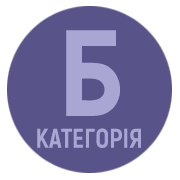LEXICAL-SEMANTIC PROPERTIES OF THE TERM IN THE UKRAINIAN LANGUAGE
DOI:
https://doi.org/10.32782/philspu/2025.9.1Keywords:
term, lexical and semantic features, terminology, polysemy, antonymy, synonymy, homonymyAbstract
The article states that modern terminology is a dynamic system, which is characterized by changes. In the digital society, new needs arise, which necessitate the need to update industry terminologies. In this case, it is not so much the term itself that is important, but the various spheres of its use. It is proven that changes cover both terminology itself as a scientific discipline and industry terminologies of different languages, in particular Ukrainian. An attempt is made to contrast the term with a commonly used word, emphasizing its characteristic features, in particular monosemy and accuracy of definition. At the same time, monosemy serves as the basis for the formation of a term, helping to avoid ambiguity or incomprehensibility in professional communication. It is found that in modern studies of the terminological system of Ukrainian scientific and professional discourse, terminological vocabulary is considered as a component of the vocabulary of a language, which is organized into a system in which lexemes and their meanings are interconnected and form a network of semantic connections. Aspects of the manifestation of these systemic connections are the phenomena around which the main lexical-semantic microsystems of the language are formed, in particular polysemy, synonymy and antonymy. It has been established that the analysis of the functioning of terms in educational discourse allows us to emphasize that the ideal model of the term is often violated. Terms, like commonly used words, become polysemic from the moment they are introduced into discourse. However, despite the changes that have occurred in the general theory of terminology in recent decades, the issues of normalization and standardization of terms remain relevant for the terminological nomenclature of the educational sphere. The lexical-semantic processes that occur in Ukrainian terminology are analyzed. The features of polysemy, homonymy, antonymy and synonymy in terminology are separately noted, and the causes of the occurrence of these phenomena are also determined.
References
Азарова Л.Є. Термінологія та її сучасний стан розвитку. Типологія мовних значень у діахронічному і зіставному аспектах : зб. наук. пр. Донецького держ. ун-ту. 1999. Вип. 2. С. 163–168.
Полюга Л.М. Повний словник антонімів української мови. НАН України, Ін-т українознав. ім. І. Крип'якевича, Укр. мовно-інформ. фонд. 3-тє вид., доп. і виправ. Київ: Довіра, 2006. 506 c. (Словники України).
Словник синонімів української мови : у двох томах / А. А. Бурячокта ін. Національна академія наук України, Інститут мовознавства ім. О. О. Потебні, Інститут української мови. Київ : Наукова думка, 1999–2000.
Демська О.М., Кульчицький І.М. Словник омонімів української мови. Львів : Фенікс, 1996. 223 с.
Сучасний словник іншомовних слів : близько 20 тис. слів і словосполучень / уклад. О.І. Скопненко, Т.В. Цим- балюк. Київ : Довіра, 2006. 789 с.
Радомська Л.А., Азарова Л.Є. Семантичні відношення в термінологічних іменниках-юкстапозитах : монографія. Вінниця, 2016. 196 с.
Томіленко Л.М. Термінологічна лексика в сучасній тлумачній лексикографії української літературної мови : монографія. Івано-Франківськ : Фоліант, 2015. 160 c.
Лисиченко Л.А. Лексико-семантичний вимір мовної картини світу. Харків : Вид. група «Основа», 2009. 191 с.
Вознюк Г.Л. Термінологічна лексика в системі професійного мовлення. Львів : Львівська політехніка, 2013. 92 с.
Непийвода Н.Ф. Мова української науково-технічної літератури (функціонально-стилістичний аспект). Київ : ТОВ Міжнар. фін. агенція, 1997. 303 с.
Cavico F. J., Bahauddin G. M. Making The Case For The Creation Of An Academic Honesty And Integrity Culture In Higher Education: Reflections And Suggestions For Reducing The Rise In Student Cheating. American Journal of Business Education. 2009. № 5. P. 75–88.







